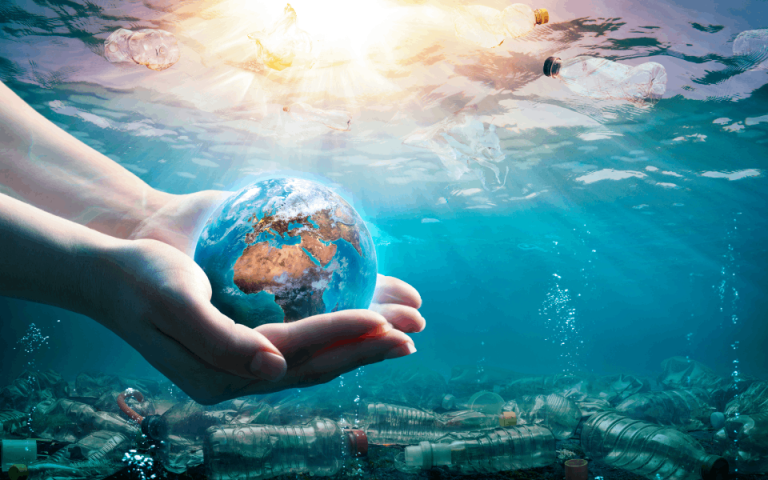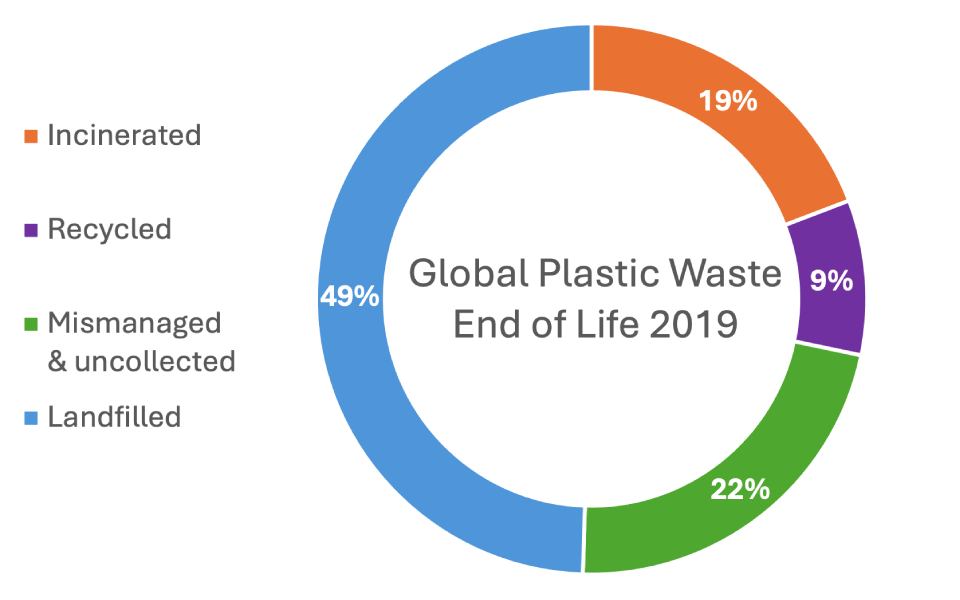Should we be concerned about microplastics?
22 April 2024
This year’s Earth Day theme Planet vs. Plastics calls for awareness on the health risks of plastics, phasing out single use plastics and ending fast fashion. Read the blog by our Chemical Sustainability student Runbang about the effects of microplastics, and possible solutions.

It is not news that plastic waste poses threats to all lives on Earth. A dreadful fact was reported by the UN environment programme: global plastic waste accumulation reached a shocking amount of 9,200 million tons from 1950 to 2017, and it’s expected to keep rising in the future years. In 2019, statistics provided by the Organisation for Economic Co-operation (OECD) indicated that only 9% was recycled, and 49% ended up in the landfill.
 Global plastic waste data in 2019. Adapted from OECD Global Plastic Outlook Database 2019.
Global plastic waste data in 2019. Adapted from OECD Global Plastic Outlook Database 2019.

You might not think much about what happens to trash in landfills, but it does not lay there doing nothing. It releases tiny plastic particles (<5 mm) into the air and water.
Think about the dust collected from the lint filter of the dryer and after cleaning the carpet with a vacuum. Some of the microfibers that shed from our synthetic clothing can be inhaled without us even noticing.
Scientists are concerned about the potential health risks posed by these microplastics. Ingesting them may lead to inflammation in the gut and liver and affect reproduction. What's worse, harmful chemicals and pathogens could be attached to microplastic particles.
They could stick to everyday items like your table salt, apples, salad greens, and even your Friday night beer. This contamination can also affect aquatic lives and other animals, potentially introducing toxic chemicals into the food that ends up on our plates.
Additionally, modern water treatment processes usually filter out microplastics, however, smaller particles — nanoplastics — often escape the filtration. These particles are specifically alarming because they can hardly be detected by standard methods and potentially enter human cells, leading to tissue irritation or even cancer.
With this information in mind, what can be done to reduce the risks?
Recycling is not the complete solution as the reproduced product will have lower quality and will be discarded at the end of life.
What about using biodegradables? Biodegradable materials take less time to be fully broken down, but they should be treated in controlled conditions otherwise the risk of releasing microplastics to the environment persists.
Chemical methods to turn polymers back into their building blocks are energy consuming and are less likely to be implemented on a large scale due to the high cost.
Researchers at the UCL Department of Chemistry are looking to develop more efficient approaches, including PET decomposition using enzymes. One optional module in my Master’s programme specifically focuses on studying the impact of microplastics. Another module titled Core Concepts in Chemical Sustainability discusses biomass processing, where the starting materials like glucose can be obtained from sugarcane bagasse and then converted into other chemicals including polymers via enzyme catalysis.
Millions of tons of plastics are still being manufactured every year. Where there is demand, there is production. Everyone is responsible for taking actions to save the environment.
As individuals, we could help by using a tote bag when shopping, carrying our own water bottle and stop buying clothes when it is not necessary.
As a student while doing lab work, I try to avoid using disposable containers and follow waste management rules.
I love fashion and I have definitely purchased more clothes than I need. It is not easy to say no to nice new pieces, but what I would like to do now is to learn to make my own clothes. A few cuts and stiches could give your old treasure a new life. It is fun and it would also give me a sense of fulfilment.
Recycling will never work unless the production is largely reduced.
Runbang Fu
MSc Chemical Sustainability student (Department of Chemistry)
 Close
Close

